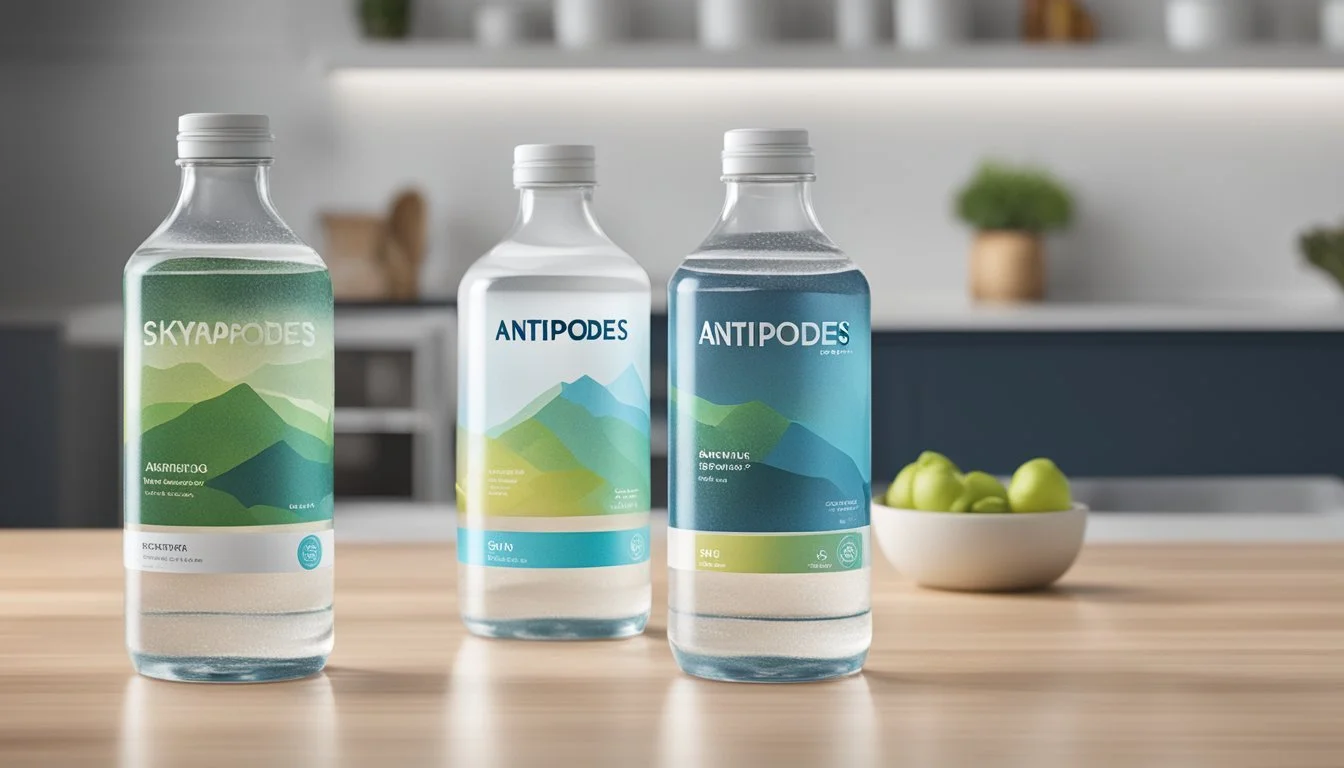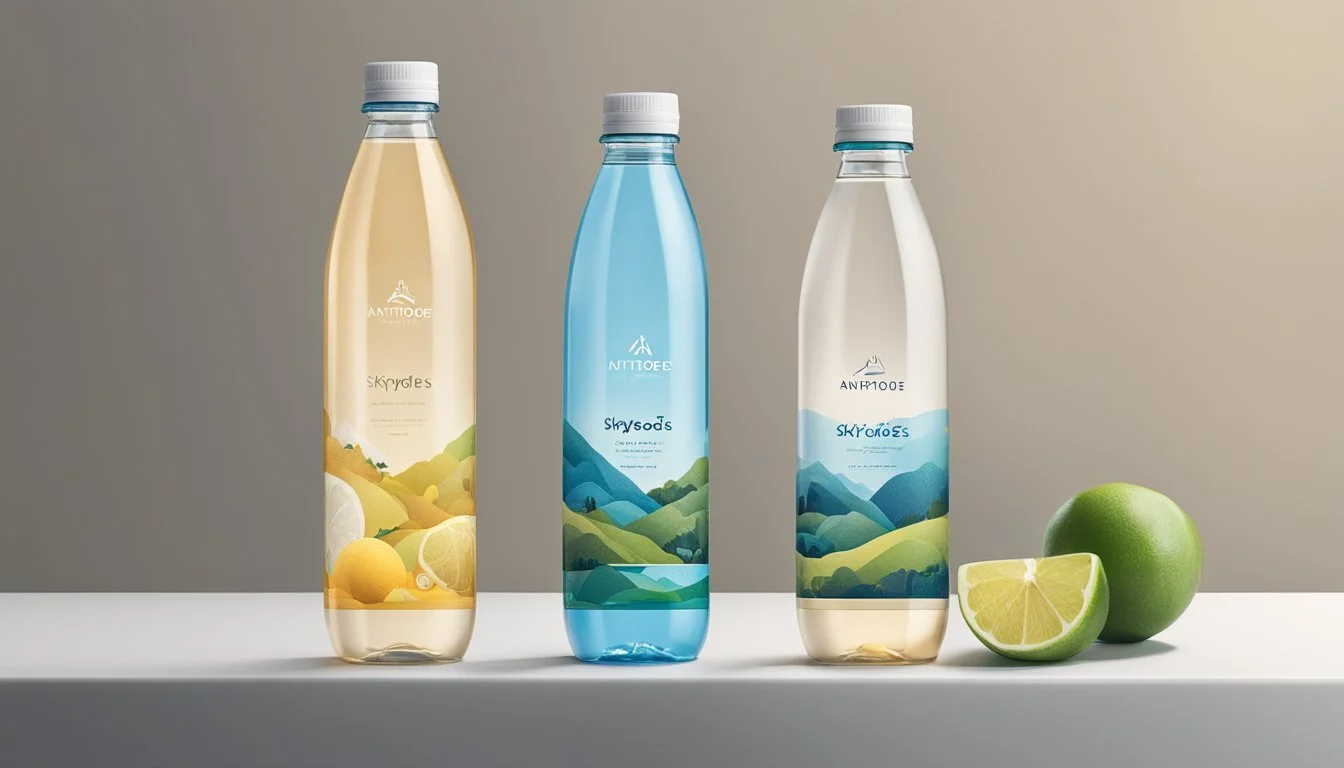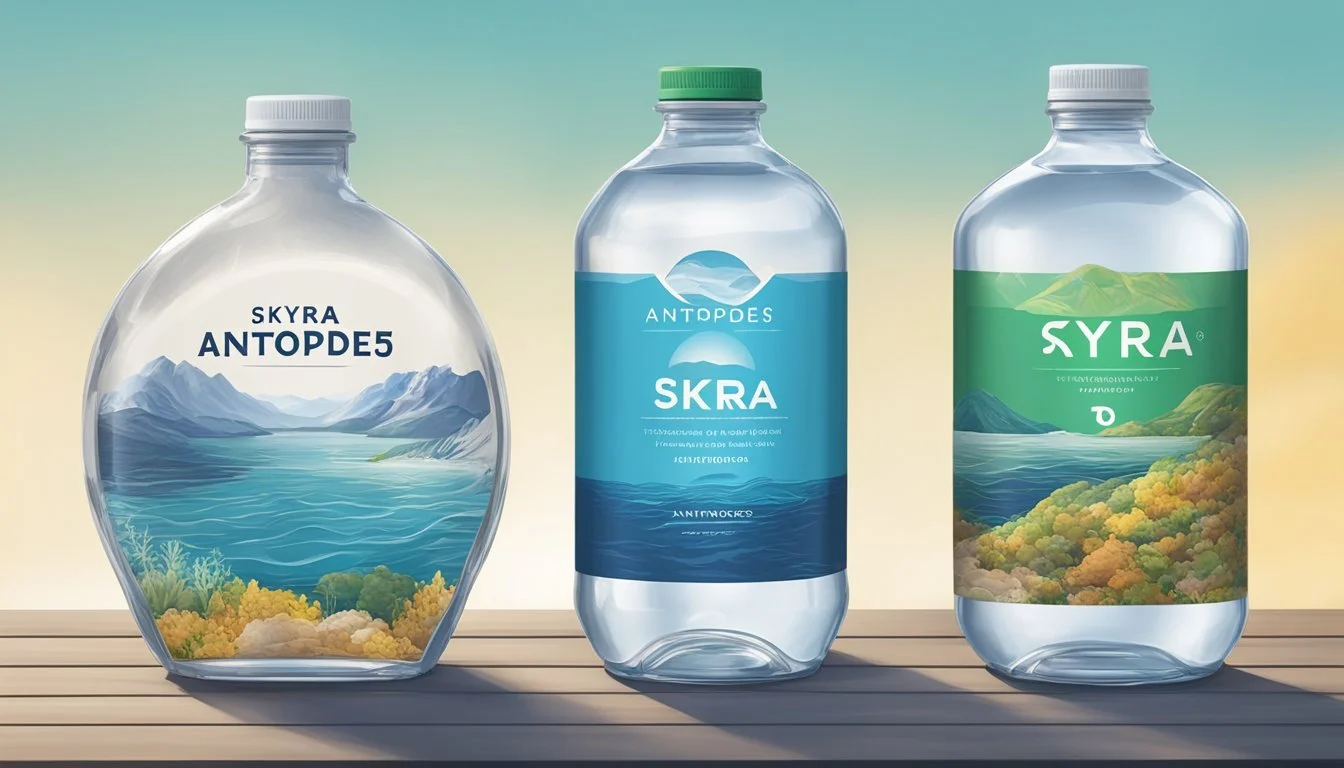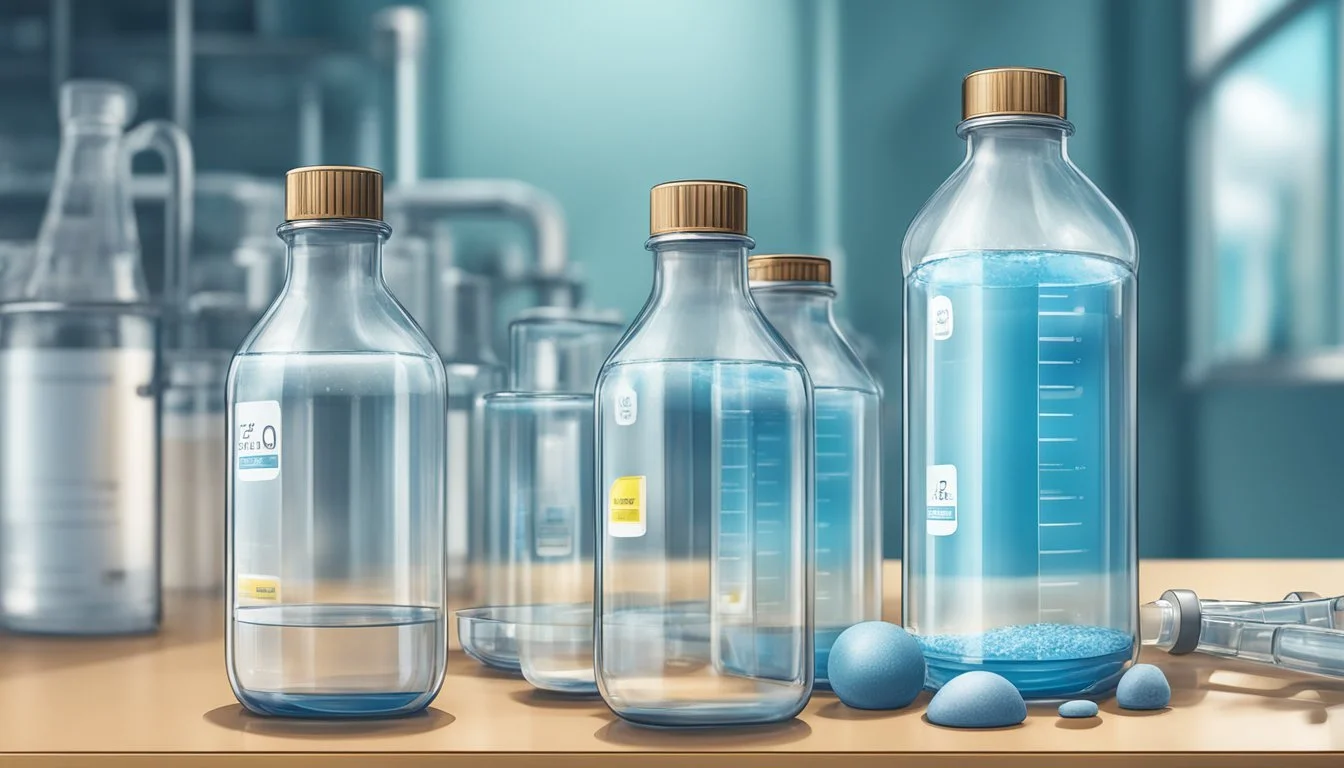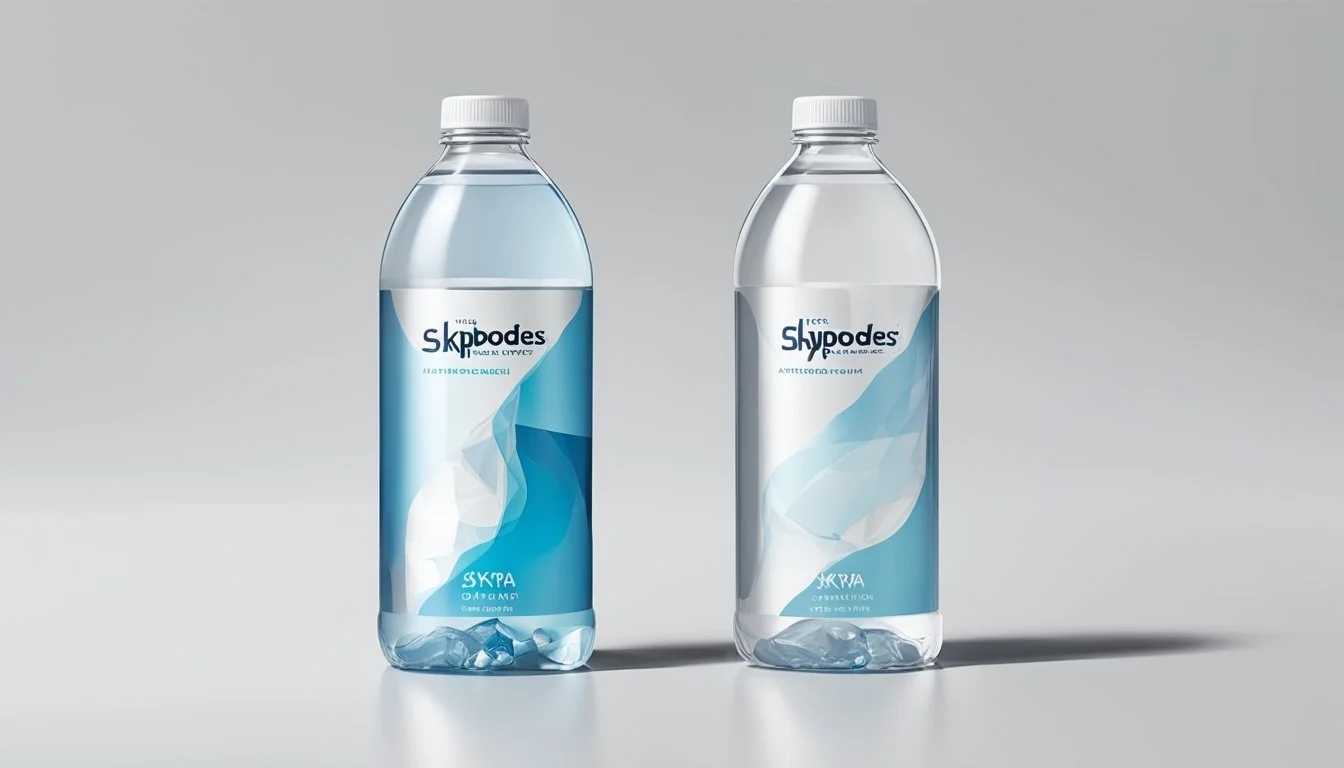Antipodes vs. Skyra
A Comparative Analysis on Quality
When comparing bottled water brands, the debate often comes down to specific attributes like taste, purity, and health benefits. Two standout brands in this regard are Antipodes and Skyra. Antipodes offers a smooth, clean taste with its naturally alkaline water sourced from New Zealand, positioning it as a premium option for those seeking high-quality hydration.
Skyra, on the other hand, boasts an impressive pH balance of 8, making it an alkaline water brand that might appeal to consumers looking for potential health benefits. The water is sourced from Iceland, known for its pristine natural environment, which adds to its allure. Skyra's distinctive taste and alkaline property provide a unique drinking experience.
When deciding between Antipodes and Skyra, consumers might prefer Antipodes for its velvety mouthfeel and impeccable purity, while Skyra could be more attractive to those interested in the benefits of alkaline water. This head-to-head comparison will help you determine which bottled water better fits your needs and preferences.
Understanding Bottled Water
Bottled water has become a significant commodity worldwide due to its convenience, perceived purity, and taste. The following sections will explore the global market, categorize types of bottled water, and evaluate its environmental impact.
The Global Bottled Water Market
The global bottled water market is vast, reflecting the growing demand for safe and convenient hydration options. Key players include brands like San Pellegrino, Evian, and Fiji. According to market research, the industry is expected to continue expanding due to increasing urbanization and health awareness. Bottled water often serves as an alternative to tap water, especially in regions where the latter's quality is questionable.
Sales channels are diverse, including supermarkets, convenience stores, and online platforms. The market also sees frequent innovations, such as infused waters and sustainable packaging solutions.
Categories of Bottled Water
Bottled waters are classified into several categories based on source and treatment. Spring water comes from underground sources and flows naturally to the surface. Mineral water contains a consistent level of minerals from the source. Purified water has been through processes like distillation or reverse osmosis to remove impurities.
Artesian water is drawn from a confined aquifer, while well water is extracted from a hole bored into the ground. Each type offers different benefits and taste profiles, influencing consumer preferences.
Environmental Considerations
The environmental impact of bottled water is a critical concern. The production and disposal of plastic bottles contribute significantly to pollution. Additionally, transporting bottled water generates carbon emissions.
Efforts to mitigate these issues include the development of biodegradable and recyclable packaging and initiatives promoting water refill stations. Consumers are also encouraged to weigh the benefits of drinking water from reusable bottles, which can reduce reliance on disposable plastic.
Adopting more environmentally responsible practices can help balance the convenience of bottled water with the necessity of protecting our planet.
Profile of Antipodes
Antipodes, sourced from an aquifer in New Zealand, offers refined taste and balanced mineral content. This premium bottled water, packaged in elegant glass bottles, aligns with a philosophy of sophistication and environmental responsibility.
Origin and Source
Antipodes originates from an ancient aquifer located in New Zealand. Known for its pristine natural environment, this source provides exceptionally pure water. The aquifer's depth helps protect the water from contaminants and pollution. New Zealand's strict environmental regulations further ensure the water remains pure and uncontaminated from source to bottle.
Taste and Mineral Content
Antipodes is celebrated for its clean, refreshing taste. It boasts a balanced mineral composition, enriched with calcium and sodium in optimal quantities. The water's pH level is near neutral, contributing to its smooth and light finish. This balance makes it a preferred choice for those seeking high-quality, natural spring water with a subtle taste that enhances any dining experience.
Packaging and Brand Philosophy
Antipodes is packaged in tasteful glass bottles, reflecting the brand's commitment to sustainability and quality. The elegant design not only elevates the drinking experience but also underscores the brand’s dedication to minimizing environmental impact. The choice of glass over plastic highlights Antipodes's philosophy of purity and sophistication, making it a standout choice in a market often dominated by less environmentally friendly options.
Profile of Skyra
Skyra, renowned for its pristine natural Icelandic spring water, stands out with its high pH and unique filtration process. The brand emphasizes purity, with a notable commitment to sustainability.
Source and Water Quality
Skyra water is sourced from ancient, self-replenishing springs in Iceland.
The water is filtered naturally over centuries through basalt and lava, enhancing its mineral content.
The company claims nothing is added or removed, preserving its original quality.
Skyra boasts a naturally high pH level of 8.88, implying a relatively alkaline composition.
This high pH is beneficial for those seeking to balance their body’s acidity levels.
Skyra water contains minimal amounts of calcium, magnesium, and sodium, making it suitable for those monitoring their mineral intake.
Flavor Profile and pH
Skyra's high pH level of 8.88 contributes to a smooth and clean taste, often described as refreshing and pure.
The slight alkalinity might appeal to those who prefer a less acidic flavor.
Taste tests frequently highlight its crispness and absence of any metallic or off-putting flavors.
This purity stems from its minimal mineral content, compared to other bottled water brands that often have a more noticeable taste due to higher mineral concentrations.
Brand Image and Sustainability Efforts
Skyra positions itself as a premium, environmentally-conscious brand.
The company emphasizes its sustainable sourcing methods, ensuring the natural springs are self-replenishing.
Skyra's bottling process prioritizes environmental responsibility, with recyclable bottles and eco-friendly practices.
The brand’s image leverages the pristine reputation of Iceland’s natural resources, appealing to consumers who value cleanliness and sustainability.
Overall, Skyra’s marketing focuses on purity, natural filtration, and responsible resource management, resonating with an eco-conscious audience.
Health and Safety Standards
Ensuring bottled water safety involves adherence to strict regulations and thorough testing. Both the EPA and FDA play critical roles in maintaining these standards.
EPA and FDA Regulations
The EPA regulates public drinking water systems, setting standards under the Safe Drinking Water Act. These regulations focus on contaminants like microorganisms, disinfectants, and inorganic chemicals. The FDA sets standards for bottled water based on EPA guidelines to ensure safety and purity.
Skyra and Antipodes must meet these FDA standards. They undergo regular inspections to check for compliance with contaminant levels. Bottled water must be processed, packaged, and transported in sanitary conditions. Compliance with these regulations provides a baseline assurance of safety.
Comparison of Water Reports
Water quality reports, often available on bottled water labels or company websites, provide insights into the sources and treatment of the water. Antipodes's report indicates it originates from an untouched aquifer, undergoing minimal processing. Skyra's report highlights advanced filtration to ensure purity.
Consumers should scrutinize these reports for information on contaminants such as lead, nitrates, and bacteria. Consumer Reports have emphasized the importance of checking these details to avoid potential health risks. Comparing these reports helps assess the transparency and safety practices of each brand.
Safety of Bottled Water Consumption
Bottled water from reputable brands like Skyra and Antipodes is generally safe. Both are tested for contaminants and adhere to stringent safety standards. The risk of contamination is low but not non-existent. For example, improper storage can lead to chemical leaching from plastic bottles.
The FDA’s guidelines ensure bottled water is often free from microbial and chemical contaminants. However, consumers should still check expiration dates and store bottles properly to maintain safety. Regular consumer reports highlight cases where bottled water may deviate from safety norms, making it crucial for continuous vigilance.
Tasting and Water Sommelier Insights
Understanding the taste and smell of bottled water can significantly enhance the drinking experience. Here we focus on the expertise of water sommeliers, the sensory evaluation of water, and the role of hydration and palate cleansing in water tasting.
The Role of a Water Sommelier
A water sommelier assesses and curates bottled waters based on their unique characteristics. They specialize in identifying the subtle nuances that distinguish different types of water. These professionals consider factors like mineral content, pH level, and source, which all contribute to the water's taste and quality.
Water sommeliers use their refined palates to provide recommendations that suit various preferences and occasions. Their expertise helps consumers make informed choices, whether they are selecting water for daily hydration or pairing it with a meal.
Evaluating Water by Taste and Smell
When evaluating bottled water, taste and smell are paramount. The taste of water can range from sweet to slightly bitter, influenced by minerals like calcium, magnesium, and sodium. Smell, though often subtle, can reveal chlorine or earthy notes depending on the purification process and source.
Antipodes: Known for its neutral taste and crisp finish, it offers a smooth mouthfeel with hints of minerality. It often scores high in taste tests for its purity.
Skyra: Praised for its slight sweetness and balanced mineral profile, providing a refreshing and clean experience. It often has a velvety texture, which is a hallmark of high-quality bottled water.
A proper tasting involves small sips, allowing the water to linger on the palate to detect all flavor notes. Sommeliers often use their keen sense of smell to detect any off-notes that might indicate impurities.
Hydration and Palate Cleansing
Proper hydration is crucial for an accurate water tasting. Hydration affects the body’s ability to perceive flavors accurately. Drinking water consistently keeps the palate fresh and receptive. During tasting sessions, palate cleansing is essential to avoid flavor carryover.
Water sommeliers recommend sipping plain water between tastings to reset the palate. This practice ensures that each water sample is evaluated on its own merits without influence from previous samples. Cleansing helps maintain the integrity of the tasting process, allowing for a precise comparison between different bottled waters.
Scientific Analysis
Antipodes and Skyra are premium bottled water brands, each offering unique attributes in terms of pH balance, mineral composition, and contaminant levels. This section will explore these elements backed by scientific assessments.
pH and Mineral Composition
The pH level of water significantly influences taste and potential health benefits.
Skyra boasts a naturally high pH of 8.88, indicating an alkaline nature and potentially aiding in neutralizing acidity in the body. This water is filtered through basalt and lava, contributing to its mineral richness, which includes calcium and magnesium.
Antipodes also offers a high pH, generally ranging between 7.5 and 8.0. This alkaline level is achieved through natural filtration processes. Antipodes emphasizes its balanced taste and mineral composition, catering to those preferring a mild yet mineral-rich water.
Presence of Contaminants
An essential aspect of bottled water quality is the absence of harmful contaminants.
Skyra is marketed as being free from added substances. It undergoes rigorous testing, ensuring that no harmful contaminants such as heavy metals, including arsenic and mercury, are present in parts per trillion (ppt) concentrations.
Antipodes is similarly committed to purity. Regular testing confirms the absence of contaminants, making it a trustworthy option for consumers. Antipodes adheres to stringent international water quality standards, offering a product with reassuringly low contaminant levels.
Comparison of Lab Testing Results
Both brands invest in laboratory testing to validate their purity and mineral content claims.
Skyra publishes its lab results, showcasing a high degree of transparency. These tests confirm the presence of beneficial minerals and the absence of contaminants. The naturally high pH and low levels of undesirable substances like heavy metals are routinely highlighted.
Antipodes also shares its lab results, emphasizing its natural filtration process and low contaminant levels. The brand's commitment to quality is reflected in detailed reports that affirm its water's consistent mineral composition and purity.
By meticulously examining these factors, consumers can make an informed choice between Antipodes and Skyra based on scientific evidence.
Consumer Considerations
When choosing between Antipodes and Skyra bottled water, consumers often weigh factors like price, availability, brand reputation, and personal preferences. Each brand has unique attributes that appeal to different consumer needs and values.
Price and Availability
Antipodes is positioned as a premium brand with a higher price point due to its artisanal production and pristine source. It is often found in specialty stores and upscale grocery chains. Skyra, in contrast, is moderately priced, making it more accessible to a broader consumer base.
Both brands are distributed widely but in different markets. Antipodes can be harder to find outside urban areas, while Skyra has a more extensive distribution network, including major supermarkets and online retailers. Price-conscious consumers may find Skyra more appealing due to its affordability.
Brand Reputation and Reviews
Antipodes is known for its high-quality water sourced from deep aquifers in New Zealand, contributing to its strong reputation. Consumers and reviewers on Consumer Reports Magazine often praise its purity and taste.
Skyra also enjoys positive reviews, particularly for its balanced mineral content derived from Icelandic springs. Review-based rankings, such as those by Ryan Felton, often highlight Skyra for its consistent quality and refreshing taste.
In summary, both brands have a solid reputation, but Antipodes's artisanal image appeals to those prioritizing exclusivity, while Skyra's practicality wins favor with a wider audience.
Choosing the Right Water for Yourself
Personal preference plays a significant role in choosing bottled water. Antipodes offers a distinct, crisp taste that many consumers appreciate for its smooth finish. It is ideal for those who prioritize natural purity and are willing to invest in a premium experience.
Skyra provides a more traditional and refreshing taste, suitable for everyday hydration needs. Its balanced mineral content makes it a popular choice for those looking for both taste and health benefits.
Consumers should consider their budget, taste preferences, and the availability of each brand in their area to make an informed choice. Whether choosing the premium allure of Antipodes or the balanced practicality of Skyra, both brands offer excellent options for discerning water drinkers.
Environmental and Legal Aspects
Antipodes and Skyra are not just brands but also significant players with respect to environmental and legal aspects. This section discusses the industry's environmental impact, legal regulations, corporate responsibility, and transparency.
The Bottled Water Industry and the Environment
The bottled water industry faces criticism due to its environmental impact. High consumption of single-use plastic bottles contributes to pollution. It's crucial to note the role of companies like Antipodes and Skyra in addressing this issue.
Both brands state efforts towards sustainability. Antipodes uses glass bottles to reduce plastic waste. Skyra opts for recyclable PET bottles, attempting to minimize environmental footprints. Companies aim to maintain a balance between product demand and ecological impact.
The environmental approach of these brands is vital for environmentally conscious consumers evaluating their options.
Legal Limits and Water Quality Standards
Regulations in the bottled water industry ensure consumer safety and product quality. The International Bottled Water Association (IBWA) sets stringent standards. Compliance with these standards is mandatory for brands like Antipodes and Skyra.
Legal limits on contaminants in bottled water are strictly monitored. Both Antipodes and Skyra adhere to these limits, ensuring their products are safe to drink. Regular quality assurance tests are performed to check for contaminants and maintain purity levels.
Detailed labeling on bottles, as required by law, provides transparency about water sources and purification methods. Compliance with these laws reassures consumers of the quality and safety of their chosen brand.
Corporate Responsibility and Transparency
Corporate responsibility reflects how companies address social, environmental, and ethical issues within their operations. Brands like Antipodes and Skyra emphasize transparency in their practices.
Antipodes publicly shares information about its water source and purity levels, promoting openness. Skyra also follows suit, providing detailed reports on its website. This transparency helps build trust and credibility among consumers.
Both brands claim to ethically source their water, ensuring minimal environmental disruption. They communicate these efforts effectively, showcasing their commitment to responsibility and transparency in their operations.
Comparative Analysis
In this section, the focus is on contrasting Antipodes and Skyra bottled water, discussing consumer preferences and market trends, and providing expert recommendations based on taste tests and contamination reports.
Direct Comparison of Antipodes and Skyra
Antipodes and Skyra differ significantly in source and composition. Antipodes sources its water from deep aquifers in New Zealand, ensuring purity and high mineral content. Skyra, on the other hand, is Icelandic spring water, naturally filtered through basalt and lava.
Key Differences:
Source: Antipodes (New Zealand aquifers) vs. Skyra (Icelandic springs)
pH Level: Antipodes ~7.0 vs. Skyra 8.88
Taste: Both are noted for their clean taste, but Skyra has a slightly mineral-rich flavor due to its filtering process.
Consumer Preference and Market Trends
Consumer Reports data indicates a trend towards natural and minimally processed bottled waters. Skyra's high pH and pristine source attract health-conscious consumers. Meanwhile, Antipodes is often chosen for its neutral pH and crisp taste.
Preferences:
Skyra: Preferred by those who value a high pH and natural filtration.
Antipodes: Favored for its pure, balanced taste and simplicity.
Market trends show a growing awareness of contaminants, including PFAS, which drives demand for transparency in water sourcing and testing. Both brands emphasize their rigorous testing protocols, ensuring safety and quality.
Expert Assessment and Recommendations
Experts recommend both Antipodes and Skyra for their unique qualities. Taste tests often highlight Skyra's slightly sweet, mineral-rich flavor, which some may find more appealing. Antipodes is praised for its clean, crisp taste without any aftertaste.
Recommendations:
Skyra: Ideal for those seeking a distinct, mineral-rich flavor and higher pH.
Antipodes: Best for those preferring a neutral, versatile option suitable for various palates.
Contaminant reports show both brands maintain high standards, free from PFAS and other harmful substances. Regular testing and transparent reporting bolster consumer trust.

